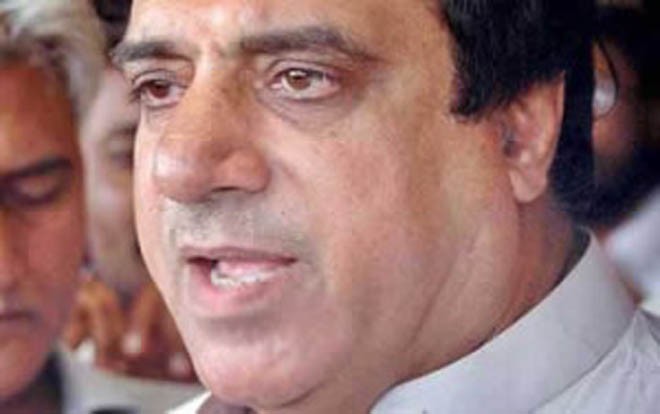
Jehangir Bader’s was a journey marked with struggle, sacrifice, resistance and resilience

The decade of 1960s was a great period in history. Revolutions and national liberation movements had inspired the youth all over the world and Pakistan was no exception.
Zulfikar Ali Bhutto was lucky in many ways. He reaped the crop sowed by leftists. The blend of old communists and Pakistan People’s Party workers produced what is known as jiyala. Jehangir Bader was one of them. Once he joined the Pakistan People’s Party (PPP), he never looked back despite all hardships and allurements. He went to jail during the martial laws of Gen. Yahya, Zia and Musharraf.
Jehangir Bader belonged to a lower middle class family of Lahore’s walled city. The urbanites would make fun of his peculiar Lahori accent.
The Maoist students of Lahore had formed an organisation by the name of Nationalist Students Organisation (NSO) in the 60s. It was the student wing of ‘Professors Group’ and I too was a part of it. When elections for the students union of The University of the Punjab were announced in 1970, it was decided that the left must put forward its own candidate to challenge the monopoly of Islami Jamiat-e Talaba (IJT).
In search of a suitable candidate, we came across two aspirants -- Jehangir Bader and Tariq Latif. The argument in favour of Bader was that he had been President of Hailey College of Commerce Students Union. Bader was chosen as the candidate of the left and liberals of the Punjab University. He was also my class fellow at Law College. While Islami Jamiat-e-Talaba nominated Hafiz Idrees, a student of Islamic Studies.
Red flags and revolutionary slogans were raised for the first time in the history of Punjab University. Professor Ijaz ul Hassan of National College of Arts designed Bader’s badges while my room Number 5 at the Law College Hostel was his campaign headquarter.
Naxalbari movement in West Bengal was at its peak so our Bengali comrades coined the slogan ‘Amra Sadar Tumra Sadar Jehangir Bader, Jehangir Bader’ and ‘Amra Bari Tumra Bari Naxal Bari, Naxal Bari’.
We were confident that our candidate would win election but, to our utter surprise, the election was rigged. On the election day, the supporters of both the candidates gathered at Students Teachers Centre, New Campus. The result was announced very late declaring Hafiz Idrees of IJT successful. That confirmed our apprehension about rigging.
The left and liberals decided that since the administration was not listening to their genuine grievances, they should register their protest by disrupting the election. The military ruler arrested a number of left activists including Bader and the NSO chief. He and the NSO Chief were awarded one year imprisonment. He was also rusticated from the university.
Bader spent one year in jail bravely without grumbling, although he would always taunt us by saying that the NSO chief chickened out. It was the beginning of many jail ‘yatras’.
Soon Jehangir Bader joined the Pakistan People’s Party. The real time to show his mettle came when he challenged the military might of General Zia. He was awarded lashes by the military court which he faced bravely. During Zia’s dictatorship, he spent most of his time in different jails of Punjab -- Shahi Qila, Kot Lakhpat, Mianwali, Faisalabad, Gujranwala, Multan.
He was President of PPP Punjab from 1985-95 and the key person who arranged the historic reception of Benazir in Lahore on April 10, 1986.
After the death of General Zia in a plane crash in 1988, he was elected Member of the National Assembly from Lahore a few months later. He served as federal minister thrice.
I don’t know how others look at this period but he was very generous and liberal and would go out of his way to oblige political workers and friends. He lost election in 1990. He was made senator twice by the PPP.
After the imposition of martial law by General Musharraf, he was arrested by the National Accountability Bureau (NAB) and remained in Camp Jail Lahore. This scribe met him at the NAB court and can vouch that he was in high spirits. He was acquitted by the NAB.
He did masters in three subjects besides studying law. Later on, he also obtained PhD. His PhD thesis was ‘Political leadership -- a case study of Benazir Bhutto 1977-88.’
When I learnt about Bader’s failing health, I along with Professor Azizuddin Ahmed, went to see him at his residence at Thokar Niaz Beg. He was very happy to see old comrades. He had a great sense of humour and knew the art of satire. Whenever we met and even during our last meeting at his residence, he taunted by saying "The NSO chief betrayed us. He could not withstand the ordeal of jail".
He served the PPP in various positions to the highest office of secretary general from 1999-2013. He was president of Punjab PPP from 1985-95 and president PPP Overseas from 1995-2003. His funeral was attended by not just workers and leaders of all political parties but the whole of Sindh’s cabinet. It was really a big funeral of a political leader and it was a resolve that the people of Pakistan are for democracy.
Jehangir Bader was a man of commitment. He remained loyal to his party despite all odds. He was held in high esteem by the PPP leadership which is visible in the hand-written letters of Benazir Bhutto, at the end of which she would write ‘your sister’.
Political parties pick their cadres from among students and induct them in the parties but, except Jamaat-e-Islami, no other political party has followed this tradition. That is why one sees Jehangir Bader as the last jiyala of the PPP.
Good bye my friend! You served as a beacon to budding politicians.